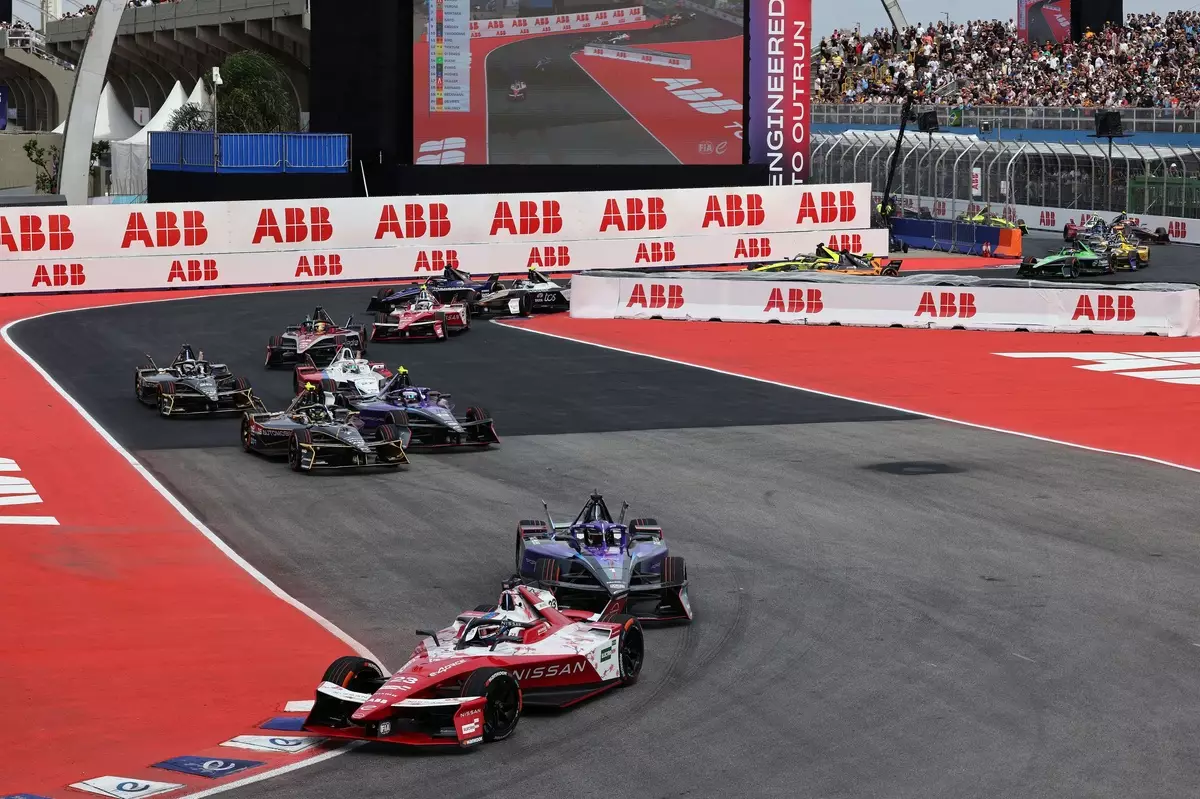The inaugural race of the 2024-25 Formula E season proved to be a rollercoaster ride for Oliver Rowland, a driver who had high hopes of clinching his first victory with Nissan in the Sao Paulo E-Prix. Starting from the second position, Rowland showcased his prowess during the qualifying rounds, narrowly missing the pole by a mere 0.099 seconds behind reigning champion Pascal Wehrlein. The race began with anticipation, as Rowland’s strong start saw him take the lead off the line, a promising development that hinted at a potentially triumphant outing.
The street circuit of Sao Paulo offered a challenging yet exhilarating backdrop, one where skill and strategy were paramount. Rowland’s performance in the early laps was commendable; he not only demonstrated speed but also showcased an impressive ability to manage race dynamics. However, as the events unfolded, it became increasingly evident that racecraft alone would not be enough to secure a podium finish.
Leading the race initially allowed Rowland to establish an advantage over his competitors. Nonetheless, the introduction of Attack Mode saw Nick Cassidy take a measure of control, a momentary shift that was further compounded by unforeseen circumstances when a red flag was waved due to an unsafe situation involving driver Jake Dennis. At the subsequent standing restart, Rowland skillfully maneuvered past Antonio Felix da Costa, re-establishing his lead. However, this resurgence was short-lived.
The crux of Rowland’s misfortune lay in the unexpected drive-through penalty he incurred, a decision that fundamentally altered the trajectory of his race. The penalty led to an eventual 14th-place finish, an outcome starkly at odds with his early performance. His palpable disappointment emanated as he reflected on the myriad of factors that contributed to this setback.
Frustration and Mismanagement
In a candid interview with Autosport, Rowland did not shy away from expressing his frustration. His acknowledgment of “more than one f**k up” pointed to a broader context of misjudgments throughout the race. He disclosed that he had led 17 out of 35 laps, which, juxtaposed with his finishing position, underscored the impact of strategic errors. A specific grievance highlighted by Rowland was the confusion surrounding the number of laps displayed during the race. He drew parallels with a previous race in Misano, where similar miscommunication had led to a catastrophic loss of energy in the final laps.
“Had I known the correct number of laps, I could have optimized my energy management and had a genuine shot at victory,” Rowland lamented. This insight plays into a more significant narrative about the need for accurate data during a race, which can heavily influence a driver’s strategy and ultimately their success.
Overpower and Strategic Energy Management
The complications did not end with the confusion over lap counts. Rowland’s penalty arose from issues related to ‘overpower,’ a common problem that also affected his teammate Norman Nato and two customer McLaren drivers. This technical challenge created a ripple effect that put Rowland at a disadvantage compared to others who effectively utilized the stoppages to conserve energy. His own miscalculation regarding energy expenditure following the penalty became evident as he dropped places, coming in eighth by the end.
Rowland reflected on the impact of energy management more broadly: “The energy depletion during the red flags, combined with my overpower situation, severely compromised my strategic position. While the others managed to conserve energy during the early race phases, I lost ground that made it impossible to mount a competitive charge back toward the front.”
As the dust settles on the Sao Paulo E-Prix, Rowland’s experience serves as both a cautionary tale and a learning opportunity. The interplay between strategy, communication, and a driver’s ability to adapt to unfolding circumstances is ever-present in motorsport. Moving forward, Rowland and the Nissan team will undoubtedly look to refine their approach, emphasizing the critical nature of real-time data and effective energy management.
The 2024-25 season has just begun, and while Rowland’s journey in Sao Paulo ended in disappointment, it also sets the stage for redemption. After all, resilience is a hallmark of any successful athlete, and Rowland’s determination to learn from his missteps may very well pave the way for future victories.


Leave a Reply